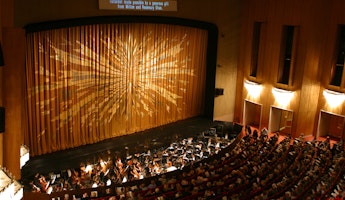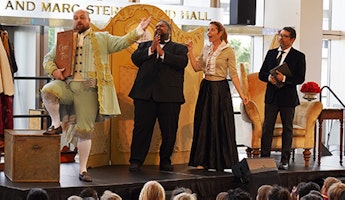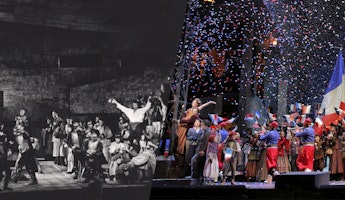Blog
April 23, 2023
LAO's New Audio Description Service
LA Opera is dedicated to bringing the art of opera to all communities especially those in overlooked and underserved communities. In efforts to bring this vision to life and enhance the viewing and listening pleasure of our audiences, we're introducing a new service for our patrons who are blind or have low visual ability. We had a chat with the President of Audio Description Los Angeles and Audio Description Solutions, Deborah Lewis, about how this service works and its importance in the arts.
Please introduce yourself and your job title.
I’m Deborah Lewis, the President of Audio Description Los Angeles and Audio Description Solutions.
What is Audio Description and what is it that do you?
Audio Description is a service for persons who are blind or have low vision. It allows them to access the visual experience of live performances, events, exhibits and film, either through live narration or a handheld device.
Audio Description Los Angeles provides live audio description for theaters in Southern California. We prepare by previewing a performance of a show, reading the script and writing the pre-show notes. These notes provide the descriptions of the sets, characters and costumes. We arrive an hour ahead of the audio-described performance and test the sound equipment. Fifteen minutes before the show starts, we read the pre-show notes to the patrons. They wear headsets that receive a signal from equipment that is located in the theater and connected to the microphone that we use to communicate with them. Throughout the show, we describe the action of the performance during pauses in the dialogue. It is similar to having someone whisper to you during a movie to tell you what is going on, but other audience members can’t hear us.
What led you to this career path and how long have you been in this role?
I have always loved the theater and got a degree in it from Otterbein College. Along the way I had several mentors who encouraged providing access to theater and the arts in general to people with disabilities. One of them introduced me to a fairly new access possibility called audio description in 1987. I was subsequently invited to a training for audio description and took this new skill back to Georgia, where I was working for an organization that provided arts access and opportunities for artists with disabilities. I started a program of audio description for the theaters in Atlanta at that time. When I moved to Los Angeles ten years later, I was asked by the Radio Reading Service here to help them describe the Rose Parade that year. This led to providing audio description training for some of the volunteers there and the eventual beginning of Audio Description Los Angeles. Several of the describers who were trained wanted to continue to do audio description in live theater, and they have become professional audio describers and co-founders of Audio Description Los Angeles. So overall, I have been involved in audio description for 36 years. My career expanded into writing scripts for the National Park Services visitors centers, training new audio describers around the United States and Canada, describing for television, educational films and movies, and providing technical assistance to museums, zoos, aquariums and gardens to establish audio description programs. I acquired Audio Description Solutions in 2015 from another mentor, Bill Patterson, and continue this work today.
Audio description is pretty new to LA Opera. Can you tell us how it all came about?
Several of the patrons who attended scheduled audio described performances were interested in opera and spoke to one of the audio describers that they had gotten to know about describing it. She provided them with a contact at LA Opera and they called to set up an audio described performance. LA Opera contacted ADLA and we provided a describer for that performance. They continued to ask for audio description and other people started to request it as well, so LA Opera decided to add audio description to their schedule. ADLA describes one performance of each opera in the season.
How is audio describing for opera different from a movie?
Since opera is live, the describer sits in a space where they can see the performance and the supertitles. They describe in the spaces of the opera and read the supertitles as they appear. In a movie, the audio describer watches it several times and creates a script with cues and timing for audio description. They go to a studio and record the description, and it is put on the film so it can be accessed by a patron watching the film at home or in the theater. The process is a little different, but the description is the same.
Why do you think these resources are so important, especially in the arts space?
If I understand this question, there are several answers to it.
First of all, it is the law. The Americans with Disabilities Act requires that all public spaces need to be physically and programmatically accessible to people with disabilities. This takes a variety of types of services that are chosen by the organization itself and is often based on what is requested and if there are services available in each community. But accessibility is something that should be reviewed and provided by each organization.
Second, it is important for people with any kind of disability to be able to participate in the arts as an audience member and an artist. And when you look at the population, all of us have some sort of disability at some point in our lives, whether it is temporary or permanent, small or large. We all want to have full lives despite any challenges that we may face.
How would someone go about requesting this service?
A patron who wants audio description, or any kind of access service, should call the organization and ask for it. All arts organizations should be able to provide audio description and other services to their patrons if requested.
How can people find out more information?
They can call me at 626.818.0439 or email me at deborahlewis@audiodescriptionsolutions.com. I can answer questions and provide them with our current calendar as well as put them on the email list to receive updated information. We are currently updating our website but at some point, they will be able to access that as well.








/03-cosi/_dsc0996_pr.jpg?format=auto&fit=crop&w=345&h=200&auto=format)















